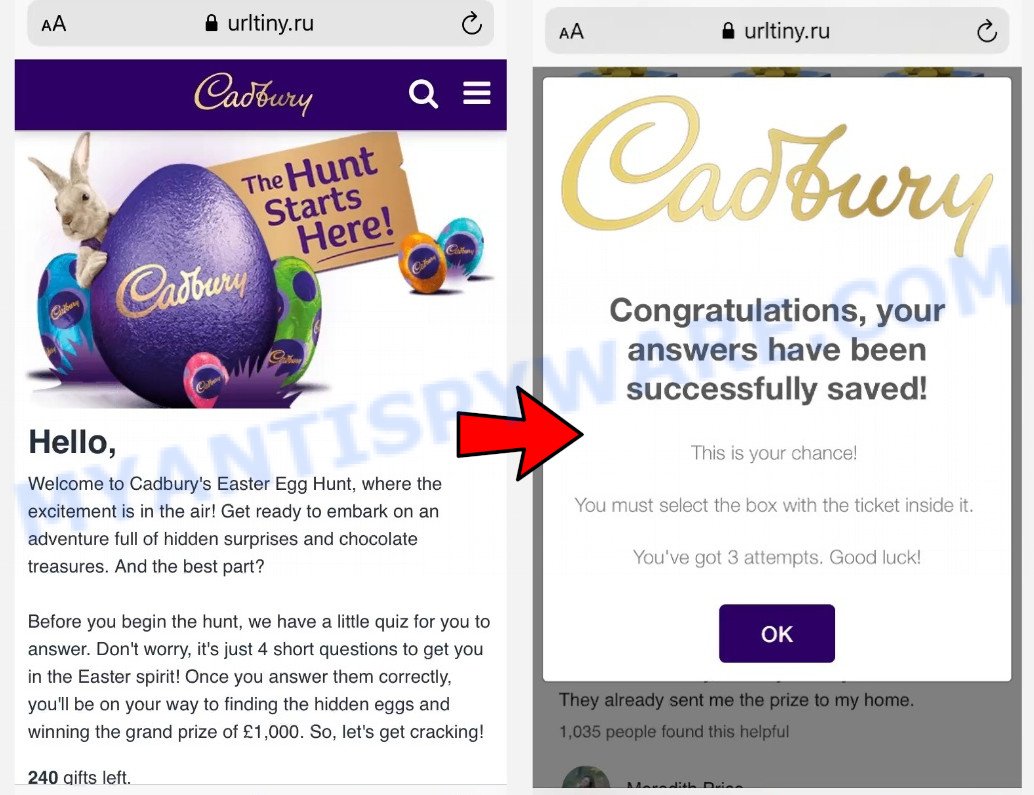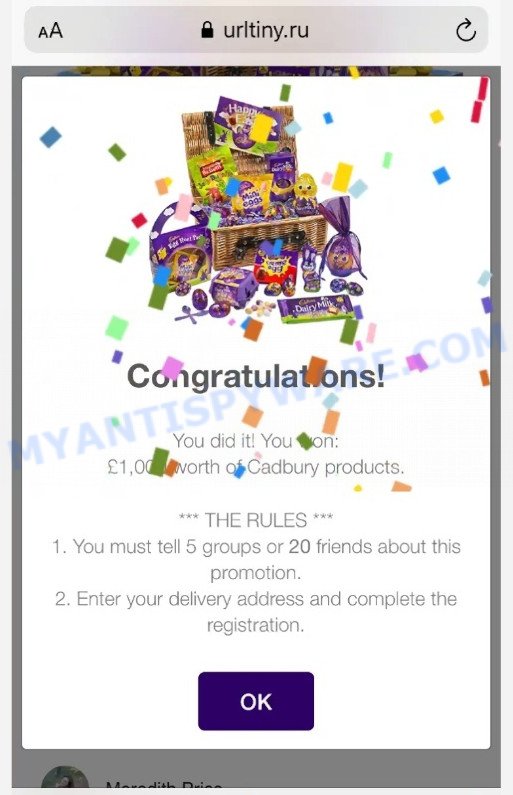Scammers are becoming increasingly sophisticated in their methods to deceive people and steal their personal information. One common tactic is to create fake websites that offer attractive prizes or promotions in exchange for completing a quiz or sharing the offer with friends. Cadbury’s Easter Egg Hunt is one such example, where unsuspecting users are promised the chance to win £1,000 worth of Cadbury products if they answer a few short questions and share the promotion with their contacts. However, upon closer inspection, it becomes clear that the website is a scam designed to collect users’ personal information and potentially use it for fraudulent purposes. In this article, we’ll take a closer look at the Cadbury’s Easter Egg Hunt scam and offer some tips on how to avoid falling victim to similar scams in the future.

QUICK LINKS
- How the Cadbury Easter Egg Hunt Scam works?
- What to do if you receive a message with a link to the Cadbury’s Easter Egg Hunt promotion?
- How to Spot and Avoid Such Scams?
How the Cadbury Easter Egg Hunt Scam works?
Cadbury’s Easter Egg Hunt scam is a fraudulent promotion that seeks to trick people into sharing their personal information in exchange for a chance to win £1,000 worth of Cadbury products. The scam operates through a fake website that presents itself as an official Cadbury promotion. The website invites users to participate in an Easter egg hunt adventure full of hidden surprises and chocolate treasures, but requires them to complete a quiz first.
The quiz consists of four short questions that are designed to make the user feel like they are participating in a legitimate promotion. Once the user answers the questions correctly, the website congratulates them and directs them to a screen where they are prompted to select a box with a ticket inside it. The user has three attempts to select the right box, but no matter which box they select, they are always told that they have won the prize.

After winning the supposed prize, the user is then asked to share the promotion with five groups or 20 friends on WhatsApp and enter their delivery address to complete the registration process. This is where the scammer collects the user’s personal information, which can be used for identity theft or other fraudulent activities.

It is important to note that Cadbury has no involvement in this scam and is not responsible for any harm caused to users who fall for it!
Here is a step-by-step explanation of how the Cadbury’s Easter Egg Hunt scam works:
- The user receives a message on WhatsApp or another social media platform that appears to be from a friend or contact, inviting them to participate in Cadbury’s Easter Egg Hunt and providing a link to the promotion.
- The link leads the user to the urltiny.ru website (read more, Urltiny.ru WhatsApp Scam: Don’t Fall for the Free Beer Fridge Trick), which is designed to look like a legitimate Cadbury promotion website. The website may include Cadbury branding and Easter-themed graphics to make it appear more convincing.
- The user is prompted to participate in the Easter egg hunt adventure and complete a quiz to get them in the Easter spirit.
- The quiz consists of four short questions that are designed to make the user feel like they are participating in a legitimate promotion. The questions are usually very easy and straightforward, such as “What is the name of Cadbury’s famous chocolate bar?”.
- After answering the questions correctly, the user is directed to a screen where they must select a box with a ticket inside it to claim their prize.
- The user is told that they have won the grand prize of £1,000 worth of Cadbury products, but they must first share the promotion with five groups or 20 friends on WhatsApp and enter their delivery address to complete the registration process.
- By sharing the promotion on WhatsApp, the user inadvertently spreads the scam to their contacts, who may also be tricked into participating and sharing their personal information.
- The user may also be prompted to click on additional links or download software to claim their prize, which could result in further harm or theft of their personal information.
- Meanwhile, the scammers behind the urltiny.ru website collect the users’ personal information, which can be used for identity theft or other fraudulent activities.
It is important to note that anyone who receives a WhatsApp message or social media post with a link to the Cadbury’s Easter Egg Hunt promotion should be extremely cautious and avoid clicking on the link or sharing any personal information. Instead, it is recommended to verify the legitimacy of the promotion by checking the company’s official website or social media channels, and to report any suspicious or fraudulent activity to the appropriate authorities.
Examples of such scams
With the rise of digital communication, scams have become increasingly common. In recent years, there has been a significant increase in the number of scams that target people through social media and messaging apps. The Cadbury’s Easter Egg Hunt scam is just one example of this type of fraud. In this section, we will discuss other common scams that people should be aware of. By understanding the tactics used by scammers, you can better protect yourself from falling victim to their schemes. Here are some examples of scams similar to the Cadbury’s Easter Egg Hunt scam: KOHL’S Le Creuset Scam, Shein $500 Gift Card Scam, and Mr Beast Giveaway SCAM.
- Beast-clap.com Claim 1k from me Scam
- Url tiny ru Whatsapp Scam
- KOHL’S Le Creuset Scam
- Wp20.ru takealot.com scam
- Lnkshort.ru Whatsapp Scam
What to do if you receive a WhatsApp message or social media post with a link to the Cadbury’s Easter Egg Hunt promotion
If you receive a WhatsApp message or social media post with a link to the Cadbury’s Easter Egg Hunt promotion, there are several steps you can take to protect yourself:
- The first and most important step is to avoid clicking on the link. This can help prevent you from being directed to a fake website or downloading harmful software.
- If you are interested in participating in the promotion, it is recommended to verify the legitimacy of the promotion by checking the official Cadbury website or social media channels. Legitimate promotions are usually advertised on the company’s official channels, so if you cannot find any information about the promotion there, it is likely a scam.
- If you suspect that the message is a scam, report it to the relevant authorities. For WhatsApp, you can report the message by tapping and holding on the message and selecting “Report” from the menu. For other social media platforms, look for a “Report” or “Flag” option.
- If you receive a suspicious message, it is important to warn your contacts about the scam to prevent them from falling victim to it. You can do this by forwarding the message to your contacts and explaining why you believe it is a scam.
- Never provide personal information, such as your address, phone number, or credit card details, in response to a suspicious message or website. Legitimate companies would never ask for this information in this way.
By following these steps, you can help protect yourself and others from falling victim to the Cadbury’s Easter Egg Hunt scam and other similar scams.
Threat Summary
| Name | Cadbury’s Easter Egg Hunt Scam |
| Type | Phishing Scam |
| Fake claims | Offers a chance to win £1,000 worth of Cadbury products |
| Scammers websites | urltiny.ru |
| Disguise | Disguised as an Easter egg hunt promotion |
| Symptoms | Unsolicited messages or social media posts |
| Damage | Financial loss, identity theft |
| Distribution methods | WhatsApp messages, social media posts |
| Prevention Tips | 1) Do not click on suspicious links; 2) Verify the legitimacy of the promotion through official channels; 3) Warn your contacts about the scam; 4) Protect your personal information |
| Reporting Info | 1) Report the message to WhatsApp or other social media platforms; 2) Report the scam to the relevant authorities (such as the National Fraud and Cyber Crime Reporting Centre in the UK); 3) Consider reporting the scam to Cadbury’s customer service or social media channels |
How to spot and avoid such scams?

Here are some tips on how to spot and avoid scams like the Cadbury’s Easter Egg Hunt scam:
- Be wary of unsolicited messages. If you receive a message or email from an unknown sender, be cautious. Do not click on any links or download any attachments until you have verified that the sender is legitimate.
- Look out for spelling and grammatical errors. Scammers often use poor spelling and grammar, which can be a red flag. Legitimate companies usually have a team of professional writers who proofread their communications.
- Check the website address. Before you enter any personal information or payment details, make sure you are on a legitimate website. Check the URL to see if it matches the company’s official website.
- Don’t give out personal information. Be cautious about giving out personal information, such as your name, address, phone number, or email address. Legitimate companies will not ask for this information unless it is necessary to complete a transaction.
- Be suspicious of offers that seem too good to be true. Scammers often use enticing offers to lure people in. If an offer seems too good to be true, it probably is.
By following these tips, you can reduce your risk of falling victim to scams like the Cadbury’s Easter Egg Hunt scam. If you suspect that you have been targeted by a scam, report it to the relevant authorities immediately.
Conclusion
Scams like the Cadbury’s Easter Egg Hunt are becoming increasingly common, and it’s important to stay vigilant to protect yourself from them. By following the tips outlined in this article and being aware of the warning signs, you can reduce your risk of falling victim to these types of scams. Remember, if an offer seems too good to be true, it probably is. Always verify the legitimacy of any promotions or deals before sharing personal information or making a payment. Stay safe online and be aware of the risks posed by scammers.”





















